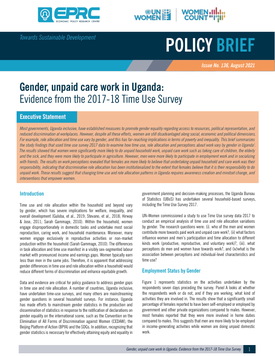Free Access | 2024-04-12
Gender, unpaid care work in Uganda: Evidence from the 2017-18 Time Use Survey
Authors/Editors: Economic Policy Research Centre
Abstract:
Most governments, Uganda inclusive, have established measures to promote gender equality regarding access to resources, political representation, and reduced discrimination at workplaces. However, despite all these efforts, women are still disadvantaged along social, economic and political dimensions. For example, role allocation and time use vary by gender, and this has far-reaching implications in terms of poverty and inequality. This brief summarizes the study findings that used time use survey 2017 data to examine how time use, role allocation and perceptions about work vary by gender in Uganda1 . The results showed that women were significantly more likely to do unpaid household work, unpaid care work such as taking care of children, the elderly and the sick, and they were more likely to participate in agriculture. However, men were more likely to participate in employment work and in socializing with friends. The results on work perceptions revealed that females are more likely to believe that undertaking unpaid household and care work was their responsibility, indicating that discriminative role allocation has been institutionalized to the extent that females believe that it is their responsibility to do unpaid work. These results suggest that changing time use and role allocation patterns in Uganda requires awareness creation and mindset change, and interventions that empower women.
DETAILS

Pub Date: August 2021
Document N0.:
Volume:
Published By: Economic Policy Research Centre
